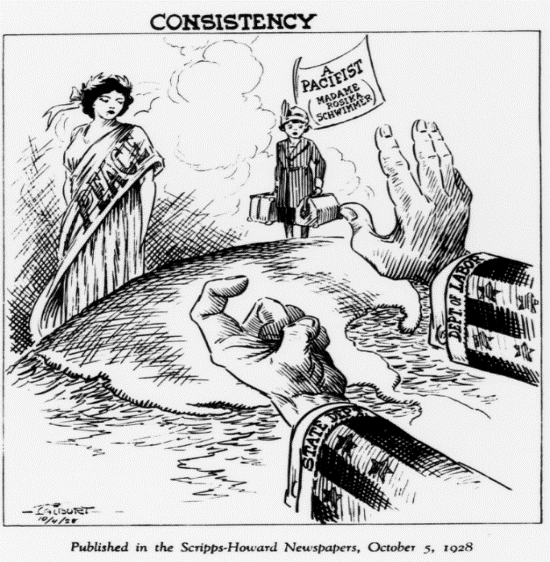After the First World War, many Americans feared that the Communist Revolution in Russia would spread to the United States. Fear outweighed rational debate, leading to a clamp down on civil liberties, with thousands arrested without warrants. In response, a small group of individuals set up the American Civil Liberties Union (ACLU). In the years since then, the ACLU has evolved from a small organization to the nation’s principal defender of civil rights, playing a role in some of the most famous events in twentieth-century American history.

The files that constitute American Civil Liberties Union Papers, 1912-1990, Gale’s recently released digital archive, cover numerous topics that resonate with contemporary researchers, such as: the first ‘Red Scare’ following the Russian Revolution of 1917; debates in the 1920s on immigration; public resistance to the American Birth Control League (the precursor to Planned Parenthood); the lynching of African Americans in the 1930s; debates on immigrants in the years immediately preceding US entry into the Second World War; and the internment of Japanese-Americans during the Second World War.

Two of the mid-century’s most important issues are particularly well represented: the war in Southeast Asia and the Civil Rights movement. Between 1945-1968, the period which has become known as the Second Reconstruction, the ACLU played a vital role in the gradual but progressive movement to provide full political rights for African Americans and to begin to redress longstanding economic and social inequalities.

Many of the rights the UCLU defends are enshrined in the US constitution, such as the freedoms of speech and press, the separation of church and state, and the free exercise of religion. These rights, elucidated in the First Amendment of 1791, are perhaps the most quoted passage of the Constitution:
‘Congress shall make no law respecting an establishment of religion, or prohibiting the free exercise thereof; or abridging the freedom of speech, or of the press; or the right of the people peaceably to assemble, and to petition the government for a redress of grievances.’

The Fourteenth Amendment, enacted following the Civil War, granted citizenship to all persons ‘born or naturalized in the United States’, and provided all citizens with ‘equal protection’, clarifying the essential meaning of the First Amendment. Needless to say, the Fourteenth Amendment was not enforced during much of the century that followed its enactment, and the ACLU had a great deal of work to do to defend its core principles:
‘No state shall make or enforce any law which shall abridge the privileges or immunities of citizens of the United States; nor shall any state deprive any person of life, liberty, or property, without due process of law; nor deny to any person within its jurisdiction the equal protection of the laws.’

1. Prohibition of mass-picketing
2. Free speech for employers
3. Limitation of strikes in public service industries
4. Rights of government employees
5. Outlawing of closed shop: No issue if union is open to all without discrimination
6. Outlawing jurisdictional picketing
Historian Samuel Walker suggests the ACLU – involved in eighty percent of the landmark cases of the twentieth century – has played no small part in shaping the modern American constitutional law, and is thus responsible for ‘a revolution of law and public attitudes toward individual liberty’[1]. The ACLU fostered the growth of tolerance, fought to end racial discrimination, promoted a legal definition of privacy rights, and defended the rights of the unpopular, the powerless, and despised.

The American Civil Liberties Union Papers digital archive contains more than two million pages of a variety of documents, from Bills, briefs and court documents, to scrapbooks, telegrams and memorandums. Unlike many of the archives in the Making of Modern Law series, American Civil Liberties Union Papers is a manuscript collection, not a collection of monographs. It consists of two major collections, each comprised of a myriad of sub-series.
- ‘The Roger Baldwin Years, 1912-1950’ contains clippings and files on academic freedom; censorship; legislation; federal departments and federal legislation; state activities; conscientious objectors; injunctions; and labor and labor organization correspondence.
- ‘Years of Expansion, 1950-1990’ encompasses foundation project files on the Amnesty Project, 1964-1980; the Lawyers Constitutional Defense Committee, 1964-1976; and subject files on freedom of belief, expression, and association; due process of law; and equality before the law.
As part of the Gale Primary Sources programme, American Civil Liberties Union Papers is cross-searchable with other twentieth-century collections that include British Newspapers, The Associated Press, Declassified Documents Online, US Supreme Court Records and Briefs, and Archives of Human Sexuality. The ‘Topic Finder’ tool in Gale Primary Sources illustrates the broad topic ranges included in these archives as a totality.




The kinds of documents found in the ACLU archive, including many from before the organization was founded, have a startling currency and relevance today. Issues that dominated the US presidential election of 2016 – from immigration and the treatment of aliens, to voting rights, police brutality, racism and responses to ‘radicalism’ – continually crop up in this archive, making this digital resource a fascinating and really valuable tool for education and scholarship.
The American Civil Liberties Union Papers, 1912-1990 digital archive is the tenth part and latest addition to Gale’s Making of Modern Law series. It is newly released, on Friday, 16th December 2016. Please contact [email protected] to sign up for a free trial, noting that you have seen this post!



[1]Samuel Walker, In Defense of American Liberties: A History of the ACLU, Southern Illinois University Press, 2nd edition (1999)

